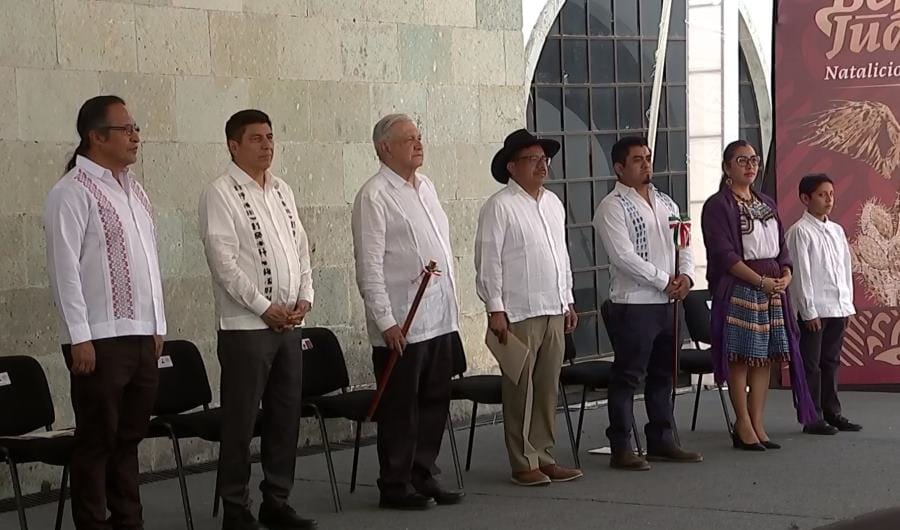Decrypting the #NarcoPresidente Conspiracy
AMLO confronts accusations of corruption, denounces smear campaigns, challenges Texas laws, and battles censorship. It's a narrative teeming with intrigue, irony, and defiance, painting a vivid portrait of political tumult and resilience.

In the Mexican politics, where words wield tremendous power and allegations can shape destinies, a recent clash between two titans has captured the nation's attention: President Andrés Manuel López Obrador (AMLO) and Ricardo Salinas Pliego, the influential president of Grupo Salinas. Their exchange, a mix of accusation and counter-accusation, offers a captivating glimpse into the politics, business, and accountability in Mexico.
It all began with a single statement from Salinas Pliego, a man known for his boldness both in business and in rhetoric. In his remarks, he pointed fingers at alleged corruption within the Mexican government, setting off a political firestorm that demanded a response from the highest office in the land.
AMLO, renowned for his directness and commitment to transparency, wasted no time in addressing the allegations head-on. Standing firm in his principles, he invited Salinas Pliego to present evidence to substantiate his claims. “We made a commitment not to lie, not to steal, and not to betray the people,” AMLO declared, encapsulating his administration's ethos in a single sentence.
The ensuing exchange unfolded not in the closed chambers of elite circles but in the public eye, underscoring the evolving nature of political discourse in Mexico. Arturo Medina, Undersecretary of the Interior, Antonio Martínez Dagnino, head of the Tax Administration Service (SAT), and Grisel Gallardo García, Fiscal Attorney of the Federation, joined the fray, presenting detailed evidence related to Salinas Pliego's tax trials.
What emerged from this exchange was not just a clash of personalities but a collision of ideologies. On one side stood AMLO, championing a vision of governance built on accountability and service to the people. On the other stood Salinas Pliego, a symbol of corporate power and entrepreneurial zeal, unafraid to challenge the existing state of affairs.
Central to the debate were the tax trials of Azteca and Elektra, two companies that fall under the umbrella of Grupo Salinas. Here, Antonio Martínez Dagnino shed light on the complexities of fiscal consolidation and outstanding debts, revealing a staggering figure of 63 billion pesos owed by Salinas Pliego's conglomerate.
But beyond the numbers lay a deeper narrative—one of power dynamics and the struggle for control. As Salinas Pliego's debts came to light, so too did questions about the balance of power between government and business interests in Mexico. Was this a case of overdue accountability, or a calculated maneuver in a high-stakes game of political brinkmanship?
The narrative took another twist as Salinas Pliego's response echoed across the political landscape. In a defiant statement, he doubled down on his allegations, vowing to present his evidence to the public via a government page. This move, he argued, would provide clarity and transparency, allowing accountants and lawyers to scrutinize the details of his trials.
Immigration Policy
AMLO's stance against the Texas anti-immigrant law is not merely a diplomatic maneuver but a resounding declaration of values. Describing SB4 as “draconian” and “anti-Christian,” he shines a spotlight on the moral imperatives at stake. His words resonate with the clarity of a trumpet call, summoning attention to the human rights violations inherent in such legislation.
But it is not just rhetoric that AMLO employs in this complicated diplomacy; it is a nuanced choreography of action and response. As he condemns the injustices of SB4, he also hints at a strategic countermove, refusing to reveal his hand prematurely. “We would rather not advance what we could do,” he declares, leaving the audience on both sides of the border intrigued and uncertain.
Yet beneath the diplomatic veneer lies a deeper truth: AMLO's resistance to SB4 is more than a political stance; it is a reflection of his understanding of history, law, and humanity itself. With a deft touch, he invokes not only international norms but also the moral teachings of the Bible, challenging the hypocrisy of those who would wield power unjustly.
In the unfolding drama of Mexican-American relations, AMLO emerges as a protagonist with a script of his own making. His refusal to accept deportations from Texas is not just a policy position; it is a statement of sovereignty and self-respect. By asserting Mexico's rights with dignity and resolve, he reshapes the narrative of power dynamics across the border.
Power Provocation
The latest act in this ongoing drama unfolded as AMLO revealed receiving a stern notification from the National Electoral Institute (INE). Their request? A seemingly innocuous demand to remove yet another Morning Conference video from social networks and YouTube. However, beneath the surface, it's a point of reference to the dense web of tensions that intertwine Mexican politics.
AMLO's response, delivered with characteristic flair, painted a picture of compliance tinged with defiance. He acknowledged the act of provocation, referring to the “shooters” – the reporters – who dared to challenge the narrative within the sacred walls of the National Palace.
But it's not just about compliance; it's a subtle power dynamics. By complying with the INE's demands, AMLO asserts his authority while simultaneously playing the role of the aggrieved party. In this narrative, communication becomes a battleground, and every word, every gesture, is laden with significance.
Embedded within this saga is the figure of Vidulfo Rosales, whose statement added fuel to the fiery exchange. His words, a warning to dissent in the face of power, reverberated through the corridors of power, challenging the current conditions with unwavering resolve.
Yet, amidst the turmoil, there's a recognition of the importance of communication. Even as the INE attempts to stifle dissent, the Morning Conference persists, its reach extending far beyond the confines of the National Palace. It's a statement to the enduring power of dialogue in a society grappling with its democratic identity.
For AMLO's adversaries, the Morning Conference is a source of frustration and indignation. They watch, seething with anger, yet unable to look away. In this paradoxical landscape, communication becomes a weapon, wielded with precision by those who seek to shape the narrative to their advantage.
#NarcoPresidente Smear Campaign
At today's mañanera, his daily press conference, there'll be no talk of social programs or infrastructure projects. This is about political warfare. AMLO has long been a polarizing figure, but now, even by Mexican standards, the political discourse has sunk to a murky new low.
For months, a digital storm has raged across social media. #NarcoPresidente is everywhere – a smear campaign of relentless intensity, painting AMLO as the puppet of Mexico's ruthless drug cartels. It's a damning accusation, an echo of Colombia's darkest chapters, designed to undermine his presidency's legitimacy.
The campaign had been simmering in the shadows, a poison seeping into public consciousness. AMLO, a savvy politician, knew ignoring it would only make it fester. Today, he's decided to strike back.
AMLO's chosen weapon isn't a fiery speech, but something even more potent in the disinformation age – facts. Taking center stage is Elizabeth García Vilchis, the no-nonsense head of Mexico's “Who's Who in Lies” section of the mañanera – the president's in-house fact-checking squad. With a schoolteacher's patience, but the focus of a laser beam, Vilchis systematically dissects the #NarcoPresidente campaign.
The revelations come thick and fast. Vilchis paints a picture not of grassroots outrage, but of a well-oiled political machine. She traces the campaign's financial umbilical cord all the way back to the state government of Guanajuato. This isn't the work of outraged citizens; it's a multi-million peso smear campaign, orchestrated by AMLO's political enemies. The opposition PAN party, its stronghold in Guanajuato, stands accused.
The exposé doesn't stop at institutions. Vilchis zeroes in on one figure: Jesús Arturo Contla Cabrera. This shadowy political consultant, a man reportedly on the Guanajuato government payroll, is revealed as the puppet master behind the 'El Amonestador' Facebook page – the online heart of the #NarcoPresidente campaign. AMLO's team alleges Contla Cabrera has siphoned millions from the state to fuel his relentless attacks on the presidency.
The president hangs back, letting Vilchis' fact-based onslaught do the damage. This is a new tactic for AMLO, a man known for passionate rhetoric. The shift is deliberate, calculated. In the face of such calculated smear tactics, he's banking on the raw power of verifiable truth.
The Fallout
The accusations send a shockwave through Mexican politics. The PAN party scrambles to deny any involvement, dismissing the claims as a desperate ploy by AMLO to distract from his own failures. #NarcoPresidente suddenly seems less like a grassroots movement, and more like the grubby tool of backroom politics. But the damage is already done.
The very accusation, the merest hint of collusion with organized crime, leaves a smear on AMLO that may never fully fade. The #NarcoPresidente campaign has achieved a key goal – muddying the waters, chipping away at AMLO's reputation. His usual tactic – painting himself as the righteous outsider battling corrupt elites – loses its edge when he's forced to defend himself against the most sinister of accusations.
The exposé also highlights a growing cancer in Mexican politics: the weaponization of social media. In this new battleground, verifiable truth can take a back seat to relentless, emotionally-charged attacks.
AMLO's counterpunch is a bold gamble. Will the public see through the disinformation and punish those behind it? Or has #NarcoPresidente permanently tainted his image? Time will tell – but for now, Mexico's political discourse spirals further down into a swamp of mistrust and cynical manipulation.




